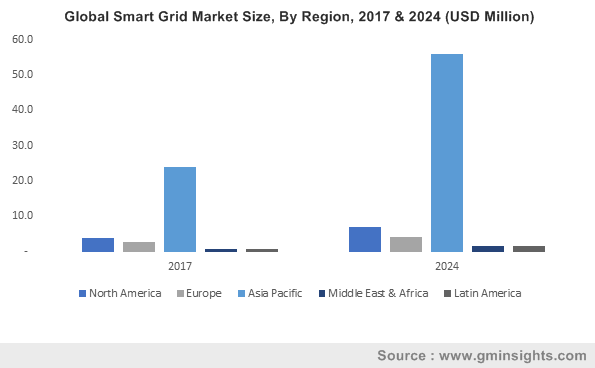Smart grid market growth to be fueled by grid renovation activities, double-digit CAGR anticipated over 2018-2024
Publisher : Fractovia | Published Date : 2018-07-04Request Sample
With the rising demand for energy and the subsequent need for efficient power supply, the smart grid market has established itself as a prime focal point for energy companies and government agencies. Along with comprehending the long-term cost benefits of smart grids, global awareness pertaining to their value in environmental protection is being created, mostly from initiatives and the legislative support extended by countries. A worldwide trend of adopting artificial intelligence (AI) and the influx of internet of things (IoT) in overall operations has carved a way into the electricity grid landscape, instigating the development of grid infrastructure. Cumulative application of smart technologies in electric appliances, power transmission structures and electricity monitoring instruments propelled the smart grid market valuation over USD 30 billion in 2017.
U.S. Smart Grid Market Size, By Technology, 2017 & 2024 (USD Million)

The smart grid ecosphere has the exact same purpose as any conventional grid system- to supply power when and where required. However, a shifting preference towards the generation and use of sustainable energy resources will gradually render the conventional grids obsolete, adding a renewed dynamism to the smart grid market trends. Solar, wind and hydro power generation have swiftly gained popularity but harnessing energy from these resources has its own challenges. A key obstacle in the supply of sustainable energy is that these sources are not available everywhere and their output is not as reliable as the conventional sources.
For example, Solar power generation will not be efficient in regions that do not receive enough sunlight and for harnessing wind energy the turbines are required to be placed only in areas with a lot of wind. A smart grid infrastructure can help overcome these impediments by using an intelligent network to store and supply energy from these resources, while balancing the energy mix and optimizing its use to lower costs for users. A balanced, reliable and affordable power supply is essential for industries to ensure uninterrupted operations. As such, energy corporations across the world are partnering with technology companies to build self-sufficient grid systems in industrial zones, demonstrating a promising arena for growth of the smart grid market.
To elaborate on the potential of smart grids, a Finland-based power company Lempäälän Energia recently allotted a contract to Siemens to build a smart grid system as part of the LEMENE project, being developed in the industrial area of Marjamäki. Siemens will shoulder the responsibility of designing and delivering a medium-voltage smart micro-grid along with the necessary automation and electrical storage systems. The company aims to ensure reliable and efficient energy supply by using the latest micro-gird technology which can monitor and control the system with the added purpose of blackout protection. Reportedly, two solar panel fields will be the source of electricity to the grid, with annual outputs of 3,600 MWh. Inherently, the services and consulting segment within the smart grid market is certain to accrue tremendous profits, with similar projects being witnessed in other parts of the globe as well.
In concept, the smart grid market functions towards adding the capabilities of monitoring, control and analysis to any electrical delivery system, allowing for maximized throughput and reduced energy consumption. It allows for a two-way communication between the utilities and the consumer, ensuring quick responses and enabling economical energy use by the consumer. The cost of power for the consumer is also considerably lowered due to less operational and management costs involved with smart technologies. Further, electricity supply can be restored faster after power outages, presenting a vital advantage of the smart grid industry.
Owing to the aforementioned benefits, the smart grid market is experiencing accelerated investments in pilot projects and associated research & development activities which are aimed at enhancing the existing grid systems, by integrating digital capabilities. Smart meters, for instance, extend the sensing capability in transfer line, by providing real-time date to utility companies and effecting price changes based on demand. User are able to get better feedback and can adjust their habits to save energy, lowering their bills. The efforts to upgrade aging electricity grid infrastructure for improving their reliability and the push by governments to install smart meters for all utilities will further bolster the smart grid market revenue.
Citing the significance of initiatives towards optimizing the power delivered in homes, the Dutch government has revealed its plan to install electricity and gas smart meters in every home before the end of 2020. The broad enterprise has been introduced with a view to form a large IoT smart grid in the country, which is representative of the remarkable progress of the smart grid industry in Europe.
With the growing necessity for better consumer-power system integration, renewable energy management solutions and a fear of undesirable consequences from blackout, the smart grid market is expected to attain a CAGR of 11% for the 2018-2024 period. Prominent industry contributors such as Siemens, ABB, Schneider Electric, Honeywell Elster and General Electric are the prominent names shaping the competitive hierarchy of smart grid market.